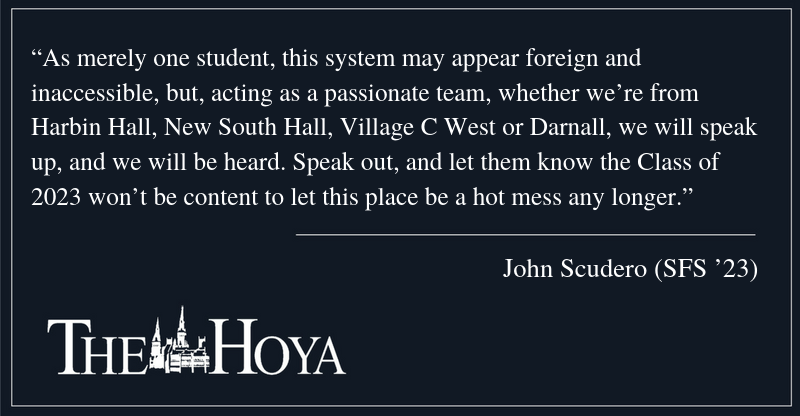Darnall Hall’s grim reputation is one of the worst-kept secrets on campus, which is why I won’t even bother describing the usual cliches, anecdotes or running jokes surrounding its existence. However, since the Blue and Gray Tour Guide Society neglected to direct attention toward its more “exciting” features during my several high school tours, including unwelcome four- or six-legged pests, mysterious smells and stains, and an indoor pool where our laundry room is supposed to be, I had little knowledge of what to expect when I walked through the door on my first day.
For all its peculiar qualities, though, Darnall turned out to house a wonderful community, with all its residents banding together to keep their heads above the water, both metaphorically and — for some — literally.
Immediately after we moved in, our common room closed for renovation to finally update decades-old fixtures, flooring and the kitchenette. The construction timeline, which we have only gleaned through scant rumor, rather than any official statement, supposedly has a November completion date, which means that, in some cases, we may be without that area for most of the first semester.
Although the common room desperately needed restoration, removing the residence hall’s sole social spaces was incredibly frustrating for everyone. Not having that meeting place meant weeks of huddling in hallways or ducking into rooms to get to know one another, which, reluctantly yet inevitably, led to the development of select friend circles and quasi-cliques, unheard of in Darnall’s usually inclusive environment. The common room can open tomorrow or in May — the damage has already been done.
What was most distressing, however, was the malaise that followed this dilemma and others like it: a discontented acceptance that while this situation is upsetting, as first-years, nothing we do will ever change our lack of agency in our own affairs for housing, academics or extracurriculars.
It’s time we abandon this perspective and acknowledge that, just as any other Hoyas, we have a right to have our grievances heard, and that, to affect change, we must not shy away from making Georgetown University fully aware of the problems first-year students face.
Just because we’re new here does not mean we don’t deserve adequate facilities or recognition by the administration. Just because we don’t yet know the process of speaking out does not mean we should sit idly by as they decide school policies that directly and, at times, negatively affect us. Just because we’re first-years does not mean we must accept all we are presented with.
A resident believing they deserve better because they attend Georgetown is not a matter of privilege. When we pay such a great deal of money for housing, with certain amenities outlined in our housing agreement, we expect they will be available to us and that the state of facilities is, at the very least, proportionate to what we pay for. For me and many others, Georgetown, regardless of our excitement at having been accepted here, was a matter of economics, of deciding if all it offered counterbalanced a steep tuition price. To that end, we might have felt somewhat hoodwinked when presented with the real state of our rooms and halls.
Darnall residents know this situation all too well, being constantly reminded of the disparities between our building and better facilities while still paying the same price as everyone else. The renovation was a meager improvement compared with the plethora of other pressing day-to-day problems in the residence, including mold exposure, tainted water supplies, leaky ceilings and a constantly malfunctioning laundry room.
And, yet, whether we cope by shrugging our shoulders, complaining or laughing it off, we always return to say we should be grateful for what we’ve been given, guilty we should think to shun what Georgetown has provided. We view the university’s housing policies as charity instead of the fulfillment of a contract, so we always seem to hesitate at challenging the flaws within those policies. Older undergraduates, and even alumni, perpetually reinforce this attitude, fondly talking about their own harrowing experiences during their first year, making it seem as though this struggle is a sacred rite of passage rather than a series of faults that should be addressed and fixed.
As first-years, we can improve on what we’ve been given and seek compensation for what’s been taken away only if we discard this belief that we must be satisfied because of the relentless “Georgetown Hot Mess” catchphrase of previous first-years. This complacency is not another Georgetown tradition to dutifully uphold; it is an unfounded norm we must reject.
Whether you’re sending an email to Residential Living, attending an Interhall Council meeting or just talking with your RA, you’ll soon realize that though these problems are ubiquitous, so is the desire to address them. You are not alone when you think you deserve better living conditions or when you feel your comment will get lost among a sea of more pertinent concerns raised by others. Your voice is just as valuable and has equal weight.
As merely one student, this system may appear foreign and inaccessible, but acting as a passionate team, whether we’re from Harbin Hall, New South Hall, Village C West or Darnall, we will speak up, and we will be heard. So inundate administrators with emails, attend those forums and set up meetings with your residence’s officials. Speak out, and let them know the Class of 2023 won’t be content to let this place be a hot mess any longer.
John Scudero is a freshman in the School of Foreign Service.














